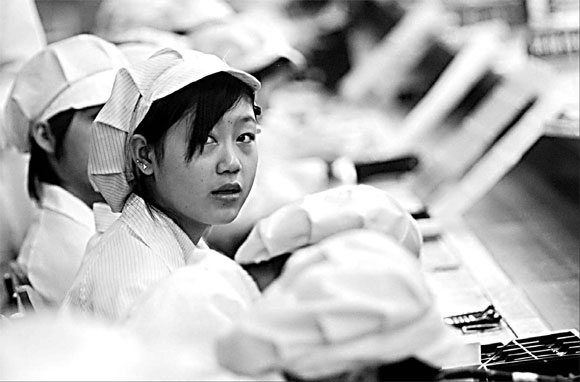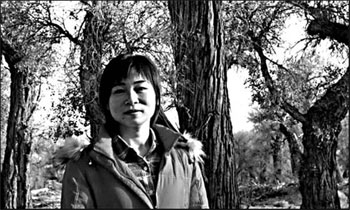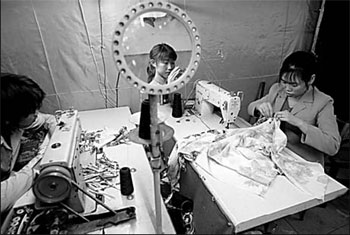Heavy metal poet
|
Rural migrant workers on an assembly line in Xiamen, Fujian province. Liu Tao |
What does the world look like through the eyes of a 27-year-old woman? It may be a vision of a happy marriage and adorable children, or an aspiring career. For Zheng Xiaoqiong, a rural migrant worker and poet, life feels just like a piece of iron.
The image of iron is prominent in Zheng's poetry and prose. In her recollections of her home village in Sichuan province, she refers to the cold, black metal gate of a country clinic. It is a symbol of illness that hangs over the village.
Zheng also reflects on her seven-years as a migrant worker in Guangdong province. In a hardware factory she wrestled with all kinds of iron machines and products, whose sharp teeth left permanent physical and mental scars on Zheng and her co-workers.
Iron is what Zheng lives on, meeting both her material and spiritual needs. This can be seen in her blog, in which, along with the iron-themed compositions, she lists the metal products she sells.
|
The hardship of being a migrant worker gives Zheng Xiaoqiong the inspiration for writing poetry. File photo |
"I always want to impart the quality of iron in my poetry, that is, a sense of shrillness and toughness," she writes in Iron/Plastics Factory, a piece which won her a prize last year from the country's top literary magazine, People's Literature. In addition to her several trophies since then, she was included in Women of China Magazine's list of the top 10 Chinese women of 2007.
Zheng didn't show any particular interest in poetry while growing up. In her hometown, while working as a medical assistant in a country clinic, she constantly felt oppressed by the job.
The pride of the family after being accepted into medical school, Zheng obsessed about how much her parents owed for her tutelage. "All I could think of was how to pay them back," she says.
Despite her family's objections, Zheng left the clinic and moved to Dongguan, a manufacturing center of Guangdong, in 2000. Her first few months were filled with hideous experiences.
Finding a good job seemed impossible and it was common for hundreds of people to apply for two or three positions. Applicants were asked to run and do sit-ups to prove their physical strength, she says.
Zheng moved from one job to another. Once in a factory making furniture, she worked 12 hours a day, without any holidays. She was paid 284 yuan ($40) at the end of the first month. "I was desperate at that time," she says. "It felt like all my ideals (for the future) vanished in one instant."
She was often penniless and regularly went hungry.
Zheng finally settled down four years ago at a factory making metal tools. There, the cutting machine took off one of her fingernails. She was lucky though, as some lost their fingers.
She wrote her first poem while recovering. "I was in the hospital. From time to time, I could hear other patients' groans, who lost their fingers on the assembly lines. I kept asking myself, what if it was you crying over such pains, and which part of my body would be hurt next time? I listened to my heart and wrote down what I thought about these assumptions. I felt a power gradually awaken inside me by the aching wound," she says.
Zheng submitted the poem to a local paper and was later published. She then began to devote all of her spare time to writing and reading. In 2004, her poems, such as Struggles and Footbridge, which depict the hardships of migrant workers, sparked debate on the Internet and helped garner attention for the so-called "migrant-worker poets".
With the support of local government, Zheng then published two collections of her poetry. She was invited to several symposiums to deliver speeches and later won the People's Literature Prize.
However, despite this mainstream recognition, Zheng's poetry has drawn sharp criticism for its coarse language, naive devices and disorderly arrangement. Some point out that her writing simply echoes the anger and disappointment of rural itinerants.
|
Women from rural areas work in a garment factory in Xi'an, Shaanxi province. Li Jie |
Zheng partly agrees. She doesn't like being labeled a "migrant-worker poet", and much prefers to be called a writer "whose poems are about migrant workers' lives".
She admits that she has not studied traditional styles of poetry. Rather than follow a format, Zheng says that she listens to the rhythm of her heart. Another source of inspiration is rock 'n' roll, as she pays close attention to the beats.
"How can a car repairman's clothes be as neat and clean as that of an office lady?" she says. "My world is iron gray. So it is with my poems."
"Between those verses of wear and tear, I am seeking the powers of love and forgiveness through which I wish to release the rage and hatred of migrants."
Although Zheng has become prominent in literary circles, her fame is largely unknown by most of her co-workers. Most people in the factory don't read poems.
"We are like products on the assembly lines, with identification marks for names. Mine is No 245," she says.
Zheng recently declined a job offer from the local writers' association and continues to sell her metal tools. She plans to return to the assembly line later this year, before completing a prose series about women migrant workers in Southern China.
"Without the pain (from hard labor), my poems are without soul," she says.
(China Daily 03/13/2008 page18)

















